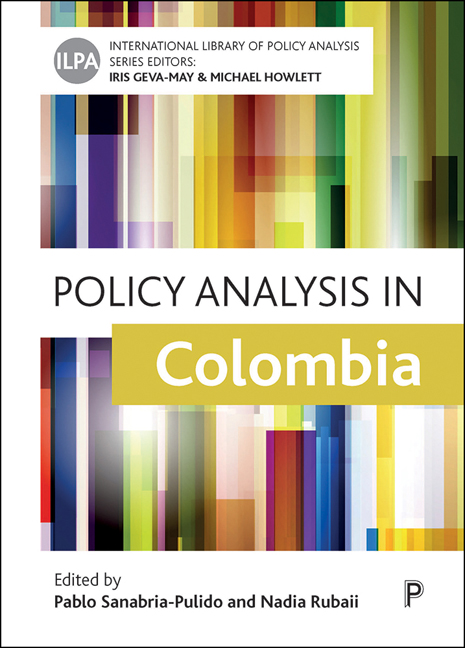Book contents
- Frontmatter
- Dedication
- Contents
- List of Figures and Tables
- List of Abbreviations
- Notes on Contributors
- Editors’ Introduction to the Series
- Policy Analysis in Colombia: An Introduction
- Part One Policy Analysis in Contemporary Colombia
- One The policy Analysis Movement in Colombia: The State of the Art
- Two Evolution of Policy Analysis as a Field of Study and Instruction in Colombia
- Three Policy Analysis, Bureaucratic Capacity and Public Administration Reforms in Colombia
- Part Two Policy Analysis within National and Subnational Governments
- Four Policy Analysis Inside Central Government in Colombia
- Five Policy Analysis and the Legislature in Colombia
- Six Policy Analysis in the Colombian Constitutional Court
- Seven Metropolitan Governance and Policy Analysis in Colombia
- Eight Policy Analysis for Decision Making in Colombian Local Governments
- Part Three Policy Analysis in Key Policy Domains
- Nine Policy Analysis in the Education Sector in Colombia
- Ten Policy Analysis in the Health Sector in Colombia
- Eleven Policy Analysis and Decision Making in the Military Forces: The Havana Experience
- Twelve Technocracy, Decision Making and Economic Policy in Colombia
- Thirteen Social Policy, Target Populations and Policy Analysis in Colombia
- Part Four Policy Analysis Beyond the State
- Fourteen Political Parties and Policy Analysis in Colombia
- Fifteen Policy Analysis and NGOs in Colombia
- Sixteen Media, Evidence and Policy Analysis in Colombia
- Conclusion: Building Capacity for Policy Analysis Amid Tensions and Challenges in Colombia
- Index
Fifteen - Policy Analysis and NGOs in Colombia
Published online by Cambridge University Press: 10 March 2021
- Frontmatter
- Dedication
- Contents
- List of Figures and Tables
- List of Abbreviations
- Notes on Contributors
- Editors’ Introduction to the Series
- Policy Analysis in Colombia: An Introduction
- Part One Policy Analysis in Contemporary Colombia
- One The policy Analysis Movement in Colombia: The State of the Art
- Two Evolution of Policy Analysis as a Field of Study and Instruction in Colombia
- Three Policy Analysis, Bureaucratic Capacity and Public Administration Reforms in Colombia
- Part Two Policy Analysis within National and Subnational Governments
- Four Policy Analysis Inside Central Government in Colombia
- Five Policy Analysis and the Legislature in Colombia
- Six Policy Analysis in the Colombian Constitutional Court
- Seven Metropolitan Governance and Policy Analysis in Colombia
- Eight Policy Analysis for Decision Making in Colombian Local Governments
- Part Three Policy Analysis in Key Policy Domains
- Nine Policy Analysis in the Education Sector in Colombia
- Ten Policy Analysis in the Health Sector in Colombia
- Eleven Policy Analysis and Decision Making in the Military Forces: The Havana Experience
- Twelve Technocracy, Decision Making and Economic Policy in Colombia
- Thirteen Social Policy, Target Populations and Policy Analysis in Colombia
- Part Four Policy Analysis Beyond the State
- Fourteen Political Parties and Policy Analysis in Colombia
- Fifteen Policy Analysis and NGOs in Colombia
- Sixteen Media, Evidence and Policy Analysis in Colombia
- Conclusion: Building Capacity for Policy Analysis Amid Tensions and Challenges in Colombia
- Index
Summary
Introduction
Nongovernmental organizations (NGOs) exert substantial influence on social, political and economic spheres globally. These organizations represent diverse efforts of collective action, political intervention, social service delivery, and watchdog activity over government and business sectors. Since the 1990s, the rise of these organizations and their influence has been referred to as a “global associational revolution” (Salamon, 1994). NGOs are part of the third sector (that is, outside of government and market sectors) and considered self-governing entities that do not distribute the excess of their revenues over expenditures among stakeholders. They are assumed to have a purpose for the public benefit that is agreed by associates of the organization (Vakil, 1997; Boris, 2006).
This chapter focuses on NGOs in policy analysis in Colombia and is organized as follows. First, it reviews definitions and terms related to the third sector in the context of Colombia. This followed by an outline of Colombia's third sector government relations over the past several decades. In the context of Colombia, NGOs provide many public services and advance many other important public goods through policy analysis and advocacy. In particular, the role of NGOs in policy analysis is important given the country's transition into a post-agreement period. Therefore, the chapter examines the role of NGOs in policy analysis in institutional spaces and through the lens of the sector's umbrella organization, the Colombian Confederation of Nongovernmental Organizations (Confederacion Colombiana de Organizaciones No-Gubernamentales – CCONG) in the postagreement and the peace process, and in the implementation and monitoring of the Sustainable Development Goals (SDGs) in Colombia.
Defining the third sector in Colombia
The third sector in Colombia is diverse as it includes unions, community-based organizations, universities, religious groups and philanthropic foundations, among others. We focus on NGOs that are engaged in the provision of public goods and services, including direct service delivery, human rights promotion, and monitoring of government and corporate sectors. They operate in a complex context in Colombia due to the country's history of violence and internal displacement, managing tense relationships with both national and local governments, and confronting recent challenges such as the Venezuelan migration crisis. The NGOs that we are most interested in are known legally as foundations and corporations/associations in Colombia. Foundations are notfor-profit, voluntarily created organizations that dedicate their assets to a public benefit and reinvest into the foundation any profits.
- Type
- Chapter
- Information
- Policy Analysis in Colombia , pp. 257 - 270Publisher: Bristol University PressPrint publication year: 2020



